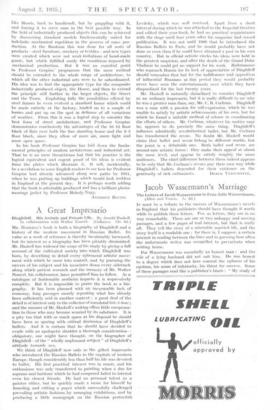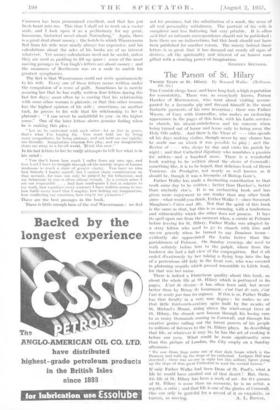Jacob Wassermann's Marriage
The Letters of Jacob Wassermann to Frau Julie Wassermann (Allen and Unwin. 7s. 6d.) The Letters of Jacob Wassermann to Frau Julie Wassermann (Allen and Unwin. 7s. 6d.) Jr must be a tribute to the success of Wassermann's novels in England that his publishers should have thought it worth. while to publish these letters. For, as letters, they are in no way remarkable. There are one or two unhappy and moving passages, and a few pages of real interest, but that is really all. They tell the story of a miserable married life, and the story itself is a readable one : for there is, I suppose, a certain interest in reading between the lines and in guessing how often the unfortunate writer was compelled to prevaricate when writing home.
For Wassermann was essentially an honest man : and the role of a lying husband did not suit him. He was honest to a degree which does not here conceal the ugliness of his egotism, his sense of inferiority, his thirst for success. Some of these passages read like a publisher's blurb : " My study of Casanova has been pronounced excellent, and that has put
fresh heart into me. This time I shall set to work on a vaster scale, and I look upon it as a preliminary for my great, humorous, historical novel about Nuremberg." Again, there is a great deal about money : the hotels to which Wassermann fled from his wife were nearly always too expensive, and his calculations about the sales of his books are of no interest whatever. Yet money-calculations need not be sordid, unless they are used as padding to fill up space : some of the most moving passages in Van Gogh's letters are about money ; and the meanness of Beethoven was on a scale to match his greatest symphonies.
The fact is that Wassermann could not write spontaneously to his wife. Every one of these letters seems written under the compulsion of a sense of guilt. Sometimes he is merely assuring her that he has really written four letters during the last few days ; more often he is vowing that his relationship with some other woman is platonic, or that this other woman
has the highest opinion of his wife ; sometimes, on another tack, he proves to his wife that his relationship to her is
platonic " I can never be unfaithful to you—in the higher sense." One of the later letters shows genuine feeling when he is making this plea :
" Let us be contented with each other—let us live in peace, that's what I'm longing for. You must hold me by being more sympathetic, by being platonic, and not hold me too tightly, too literally. Imagination requires free play, and my imagination shuts me away in a far.off world. Truk this over."
In his last letters to her he realX attempts to tell her what is in his mind :
" You don't know how much I suffer from my own ego, and how herd I have to struggle through all the muddy stages of human weakness to reach a state of greater clarity. You have no idea how bitterly I loathe myself, but I cannot claim consideration on that account, for man can only be judged by his behaviour, and my behaviour to you is often odious enough. In a certain sense I am not responsible . . . And how inadequate I feel in relation to my work, how repulsive every sentence I I ve written seems to me, how futile every word that l employ, hew halting my imagination, how conflicting my emotions, how ern; l y my pleasures " these are the best passages in the book.
There is little enough here of the real Wassermann : we feel not his presence, but the substitution of a mask, the sense of all real personality withdrawn. The portrait of his wife.is completer and less flattering, but very pitiable. It is often said that an intimate correspondence should not be publiShed : here there are no indiscretions, but this book should not have been published for another reason. The misery behind these letters is so great that it has damped out nearly all signs of distress, all the spirituality and interest of an honest man gifted with a creating power of imagination.
STEPHEN SPENDER.







































 Previous page
Previous page